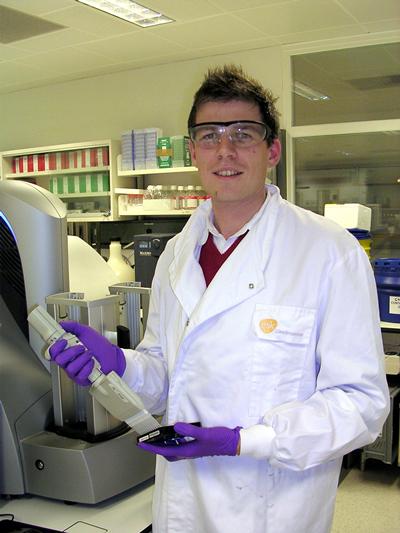Industry experience and training give post-doc a career boost

A drug company placement and Graduate School training put researcher on the right career path
Leigh Felton has never regretted his move to the biological sciences. Having won a place to study medicine at the University of Southampton, he decided in the second year that it was not for him. However he had enjoyed learning about physiology and pharmacology and decided to focus his studies there. It turned out to be a wise choice. After taking a first degree and a PhD at the School of Biological Sciences and staying on for post-doctoral research, he now works in research at GlaxoSmithKline, investigating potential treatments to combat asthma and allergies.
“I found I far preferred the laboratory work, working at a molecular level with cells and wanted to play a part in helping to create new drugs and treatments,” said Leigh. “I don’t regret making the switch from medicine.”
Leigh’s interest in science started at school in Lichfield, Staffordshire. He took combined science at GCSE and chose to do Chemistry, Biology and Maths at A Level. “I’d always been interested in a medical career of some sort and actually did some work experience in a hospital accident and emergency department,” he explained.
University life suited him well. “I really enjoyed it, it couldn’t have been better and I’d recommend it to anyone.” Outside classes he tried his hand at bell-ringing, ballroom dancing and got involved with showing films at the Students’ Union. “There’s so much to do, so many things to try which are both enjoyable and a good way to meet people and make new friends.”
During his first degree he had a period working at Pfizer in Kent. “Although it was a good experience, I felt I wasn’t ready to join a commercial company at that stage so decided to stay on at University for further study.”
With the support of supervisor Professor Lindy Holden-Dye, Leigh’s third year undergraduate project covered molecular pharmacology, studying the nematode (roundworm) C. elegans. The arrival of Professor Hugh Perry at the School, an expert in neurological diseases such as MS and Alzheimer’s disease, inspired Leigh to join his team as a PhD student looking at the effects of inflammation on the brain. He was aided during his studies by grants, including one from the Biotechnology and Biological Sciences Research Council (BBSRC).
Post-doctoral work followed, along with collaborations with companies and organisations and Leigh started to become more focused on his future career. “I took full advantage of all the courses on offer to post-doc students to help them prepare for the world of work. I took all the opportunities that were offered and learned about supervisory and managerial skills. I’m convinced that played a major part in landing the job at GlaxoSmithKline, it made me more of a useful and valuable employee to the company.”
Leigh says, “It was a bit of a shock exchanging academia for a commercial company but I’m enjoying it very much here. I only wish Stevenage was a bit closer to Southampton!”
Leigh now works in the major drug company’s research and development base in Hertfordshire. He has joined one of seven Centres of Excellence for Drug Discovery (CEDD), teams of scientists from a number of disciplines who identify and evaluate the potential of materials that could be used in drugs of the future. He has also taken on a managerial role and works with universities on joint projects.
There are differences between researching in a university and in the pharmaceutical industry: “Working for a company, you have to be mindful of the business, it’s not pure research. You need to be flexible as you may be working on something you’re interested in, or not. But the biggest thing is intellectual property. If you come up with a brilliant discovery, that belongs to the company, not you.”
“I like the edge of working for a company, wanting it to succeed and, of course, you’re so much closer to finding a cure for diseases and developing effective medicines. It’s not for everyone but I’m very glad I did it.”
He remains in touch with the University of Southampton through industrial collaborations established with research scientists in the School of Medicine, and helps supervise and mentor postgraduate students at the School of Biological Sciences.
Useful Downloads

I took full advantage of all the courses on offer, and learned about supervisory and managerial skills. I’m convinced that played a major part in landing the job at GlaxoSmithKline, it made me more of a useful and valuable employee to the company.